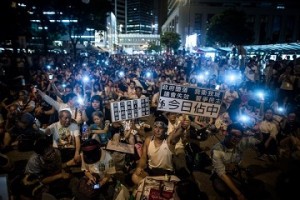Perry Link, with Ian Johnson

Philippe Lopez/AFP/Getty Images
A sit-in for democratic rights in Hong Kong’s central district, July 1, 2014
The former British colony of Hong Kong reverted to China on July 1, 1997, and on every July 1 since then Hong Kong citizens have marched in the streets asking for democracy. The demonstrations on this year’s anniversary, however, were on a much larger scale. According to the police, they drew nearly one hundred thousand people; the movement’s organizers estimate that as many as a half million people took part. The protests were not violent, and there were no clashes with the security forces who were closely monitoring the crowd. As part of the protest, in the early morning of July 2 about one thousand people sat down in Hong Kong’s central district in a disciplined exercise of civil disobedience.
More than five hundred participants in the sit-in were arrested on suspicion of organizing illegal public gatherings and incitement. Among them was Albert Ho, a member of Hong Kong’s Legislative Council and chair of the Hong Kong Democratic Party from 2006 to 2012, who was detained along with two other members of the Legislative Council and eight student leaders and held for nine hours at a police training school. Following is an edited version of interview with Ho about the protests and the future of Hong Kong, conducted over the Internet in the days after his release from detention on July 2.
Perry Link: Hong Kong has a long tradition of protests. In 2003 hundreds of thousands of people protested the imposition of the “Article 23” anti-subversion law, which would have curtailed freedom of speech and the press in Hong Kong. And in 2012 there were large protests over government efforts to require pro-Beijing “patriotic” education in schools. But the crowds this summer seem more determined. Has something changed?
Albert Ho: Yes, the July First protest this year was importantly different. Those earlier protests might be described as struggles for freedom from something—freedom from censorship or freedom from brainwashing of our children. The protest a few days ago was a demand for something: the people want free elections in order to take charge of their own house. The June Fourth commemorations are largely dedicated to the cause of democracy in mainland China. The July First demonstration was for us, right here.
Could you say more about “taking charge of your own house”? What exactly do the people of Hong Kong want?
Most people in Hong Kong, especially the young, have become increasingly dissatisfied with the performance of our Beijing-chosen chief executives—especially the present one, Mr. C. Y. Leung [a candidate chosen by a Beijing-backed election committee in 2012]. People do not see these executives as putting the interests of Hong Kong people first; their top priorities have been the interests of Beijing and of big business. The widening gap between rich and poor, the spike in property prices and rents, and the increased domination of local markets by big businesses have been dispiriting and have led young people to feel they do not have a fair chance at a good career and a bright future. Some of them are so frustrated that they have become radicalized and look for every opportunity to vent anger at the government and the whole establishment. They may not know exactly what they want, but they know they feel powerless now, and don’t like that. They see universal suffrage as perhaps the only way out, their only chance for political equality as citizens.
